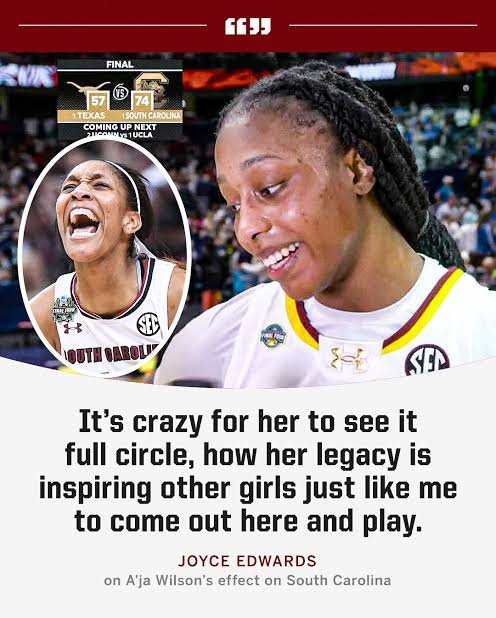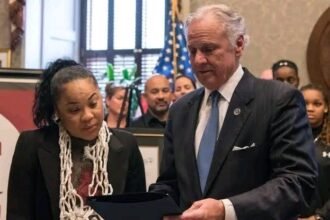**”I Wanted to Play With A’ja Wilson,” Joyce Edwards Admits—South Carolina in DISARRAY After Stunning Announcement!**
The South Carolina women’s basketball program, long regarded as a powerhouse under the leadership of Dawn Staley, has been thrown into chaos following a shocking revelation from one of its most promising recruits. Joyce Edwards, the five-star forward and one of the top prospects in the 2024 class, dropped a bombshell in a recent interview, admitting that her initial desire to play alongside WNBA superstar A’ja Wilson heavily influenced her commitment to the Gamecocks. The statement has sent shockwaves through the program, raising questions about the future of the team’s recruiting strategy and the stability of its roster.
Edwards, a 6’3” phenom known for her versatility, athleticism, and high basketball IQ, was expected to be a cornerstone of South Carolina’s next championship run. Her commitment was celebrated as a major coup for Staley, who has built a dynasty by attracting elite talent. However, Edwards’ recent comments have cast doubt on her long-term intentions with the program. “I wanted to play with A’ja Wilson,” she confessed. “Watching her dominate at South Carolina and then in the WNBA inspired me. I dreamed of being part of that legacy.”
The problem? A’ja Wilson hasn’t played for South Carolina since 2018.
Wilson, the two-time WNBA MVP and face of the Las Vegas Aces, led the Gamecocks to their first national championship in 2017 and remains one of the most iconic figures in program history. Her impact on the court and her larger-than-life presence off it have made her a role model for countless young players, including Edwards. But the idea that a recruit in the 2024 class based her decision on playing alongside a legend who graduated six years ago has left many scratching their heads—and others questioning whether Edwards truly understood what she was signing up for.
Sources within the program suggest that Edwards’ admission has caused internal tension. Some players reportedly feel misled, believing Edwards’ commitment was more about chasing Wilson’s ghost than fully buying into the current team’s culture. “It’s a little disrespectful,” one unnamed player said. “We’re here now, working hard to win, and it feels like she’s stuck in the past.”
Coaches, meanwhile, are scrambling to address the situation. Dawn Staley, known for her ability to connect with players and manage locker room dynamics, now faces a delicate balancing act. On one hand, Edwards is an undeniable talent who could help the Gamecocks compete for another title. On the other, her comments have inadvertently created a rift, forcing Staley to reassure both her current roster and incoming recruits that the program’s future isn’t tied to nostalgia.
The timing couldn’t be worse. South Carolina is coming off another dominant season but lost key players to graduation and the WNBA Draft. The team is in a transitional phase, relying on a mix of veterans and young stars to maintain its status as a national contender. Edwards was supposed to be a seamless addition, a player capable of contributing immediately while developing into the next great Gamecock. Instead, her remarks have sparked uncertainty.
Recruiting analysts are also weighing in, with some suggesting that Edwards’ statement reflects a broader trend in college athletics: the increasing influence of professional athletes on high school prospects. “Kids today grow up idolizing stars like A’ja Wilson, Caitlin Clark, and Paige Bueckers,” one analyst noted. “They don’t just want to play at a school—they want to follow in the footsteps of their heroes, even if those players aren’t there anymore.”
This phenomenon isn’t unique to South Carolina, but it does highlight the challenges coaches face in managing expectations. Programs must sell their present and future, not just their past. For Edwards, the allure of Wilson’s legacy was strong enough to overshadow the reality that she would never actually share the court with her idol in a Gamecock uniform.
The big question now is whether Edwards will stay committed—both in word and spirit. If she arrives on campus still longing for an era that has passed, it could hinder her development and disrupt team chemistry. Conversely, if she embraces the current roster and builds her own legacy, she could still become a program-defining player.
For South Carolina, the stakes are high. The Gamecocks have set a standard of excellence, and any hint of disarray is cause for concern. Dawn Staley has built a culture of accountability, hard work, and sisterhood—one that doesn’t rely on any single player, past or present. Edwards’ comments, however unintentional, threaten to undermine that foundation.
As the offseason unfolds, all eyes will be on Columbia. Can Staley mend any fractures before the season begins? Will Edwards clarify her remarks and reaffirm her commitment to the team’s current goals? Or will this unexpected drama linger, casting a shadow over what should have been another triumphant chapter for South Carolina women’s basketball?
One thing is certain: in the world of college sports, where perception often shapes reality, the Gamecocks now face a test unlike any other. The legacy of A’ja Wilson will always be a part of South Carolina’s story—but the future belongs to those who are ready to write it. Joyce Edwards may have dreamed of playing alongside a legend, but now she must decide whether she’s prepared to become one herself.





